 Petzlover
Petzlover Blue Healer is originated from Australia but Pastor Garafiano is originated from Spain. Blue Healer may grow 13 cm / 5 inches shorter than Pastor Garafiano. Blue Healer may weigh 13 kg / 28 pounds lesser than Pastor Garafiano. Both Blue Healer and Pastor Garafiano has almost same life span. Blue Healer may have less litter size than Pastor Garafiano. Blue Healer requires Low Maintenance. But Pastor Garafiano requires Moderate Maintenance
Blue Healer is originated from Australia but Pastor Garafiano is originated from Spain. Blue Healer may grow 13 cm / 5 inches shorter than Pastor Garafiano. Blue Healer may weigh 13 kg / 28 pounds lesser than Pastor Garafiano. Both Blue Healer and Pastor Garafiano has almost same life span. Blue Healer may have less litter size than Pastor Garafiano. Blue Healer requires Low Maintenance. But Pastor Garafiano requires Moderate Maintenance
 It was in 1802 that George Hall arrived in New South Wales, establishing 2 cattle stations. He had a problem – getting his thousands of cattle to the Sydney markets. He began looking at the prospect of a droving dog and imported a number of dogs of which a blue mottled dog emerged.
It was in 1802 that George Hall arrived in New South Wales, establishing 2 cattle stations. He had a problem – getting his thousands of cattle to the Sydney markets. He began looking at the prospect of a droving dog and imported a number of dogs of which a blue mottled dog emerged.
The dogs were crossed with dingoes and by 1840 the Halls Heelers were used by the Halls. However with the death of one of the Halls, their cattle stations went to action and the dogs, the Halls Heelers became available.
The dogs attracted attention, and the term ‘Australian Cattle Dog’ was adopted. The name referred to those dogs coming from Thomas Hall's ‘Heelers’. There have been many arguments about the origin of the breed, but the red or blue offspring known as Hall's Heelers were proven cattle drovers, and with further breeding experiments which included the Australian Kelpie, dingoes and the Dalmation, by 1893, the tough, robust working breed known as the Blue Heeler or the Australian Cattle Dog came about.
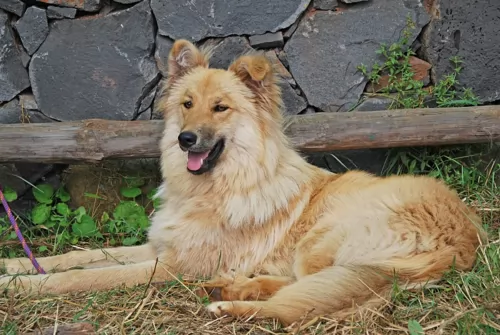 Hailing from the Canary Islands, the Pastor Garafiano is a dog which was once used for working purposes but which is essentially a pet today.
Hailing from the Canary Islands, the Pastor Garafiano is a dog which was once used for working purposes but which is essentially a pet today.
Also known as the Spanish Collie, it is not really sure if the dog really has any links to the Collie.There are dog experts who claim that there are actually very few pure specimens of this dog because of interbreeding with other breeds such as the German Shepherd.
There was a time that the breed almost disappeared but a working group was established to further establish breeding centers for the dog. Today the Pastor Garafiano is a recognized breed and he has been registered since 1982.
 Blue Heelers are medium-sized, sturdy, compact dogs who are somewhat longer than tall. The female Blue Heeler measures roughly 43–48cm at the withers, while the male measures about 46–51cm. If your Blue Heeler is in tip top condition, he’ll weigh about 15 to 22 kilograms. They are muscular with pointed, erect ears, dark eyes and long tails which are mostly hanging downwards. Their dense coats are blue- or red speckled and sometimes with tan markings.
Blue Heelers are medium-sized, sturdy, compact dogs who are somewhat longer than tall. The female Blue Heeler measures roughly 43–48cm at the withers, while the male measures about 46–51cm. If your Blue Heeler is in tip top condition, he’ll weigh about 15 to 22 kilograms. They are muscular with pointed, erect ears, dark eyes and long tails which are mostly hanging downwards. Their dense coats are blue- or red speckled and sometimes with tan markings.
The Blue Heeler is a ball of energy and he is clever too. You won’t find him sitting around for too long, and if there is sign of a walk or a ball game, he’s in! He is an independent dog, and although he makes a wonderful family pet, he tends to attach himself to that one special person in his life. He is a natural watchdog and protector of his human family.
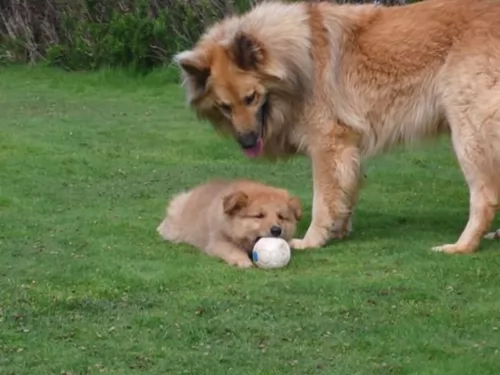 This is a medium to large dog, with its hindquarters being a bit higher than the shoulders. The body is strongly built with a deep chest. He stands at between 55 to 64cm in height and weighs between 24 to 35kg.
This is a medium to large dog, with its hindquarters being a bit higher than the shoulders. The body is strongly built with a deep chest. He stands at between 55 to 64cm in height and weighs between 24 to 35kg.
The nose is black and the eyes brown. The ears are slightly erect. The double coat is long and thick and the color is almost golden or tawny, much like a lion. Puppies are born brown and the color changes as they get older.
The tail is long, and when the dog is in motion or alert the tail is lightly curled. He is an active dog requiring a lot of intensive physical exercise. It is therefore not recommended that he be kept on a small city property but that he be on a farm or have a large garden.
This is a good looking, confident sheepdog who is also intelligent and therefore easily trained. He makes a splendidly obedient pet when he has been trained and socialized.
He is docile, calm and friendly and good with children in the home who have been taught to be kind and gentle with him. Apart from regular play, make sure he gets his regular exercise and he is constantly allowed to be part of the family.
 Training and socializing of your Blue Heeler will ensure that your dog does what you want him to. The Blue Heeler is an intelligent, responsive dog and training can benefit him, turning him into an outstanding family pet, good with children and other pets in the home.
Training and socializing of your Blue Heeler will ensure that your dog does what you want him to. The Blue Heeler is an intelligent, responsive dog and training can benefit him, turning him into an outstanding family pet, good with children and other pets in the home.
He is a playful, affectionate pet who doesn’t take easily to strangers, and this is what makes him such an excellent guard dog.
Your Blue Heeler is not an apartment dog as he requires a lot of exercise, and cooping him indoors for too long with nothing to do can lead to destructive behavior.
Head-strong, independent and robust, your Blue Heeler will need a firm owner who is boss. Add to the firm owner a lot of love and care, and you’ll have a devoted friend.
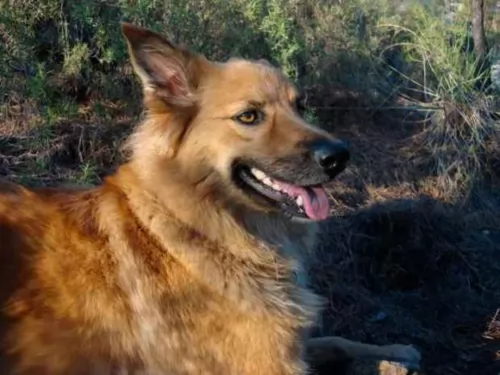 The Pastor Garafiano is such a wonderful docile and friendly pet that he is guaranteed to make a wonderful companion for any family.
The Pastor Garafiano is such a wonderful docile and friendly pet that he is guaranteed to make a wonderful companion for any family.
He is a dog that simply loves spending time with his human family and won’t do well when left alone in the backyard day after day. Take good care of this beautiful tawny dog and give him your attention and you will have a wonderful canine friend that is difficult to beat in terms of loyalty and devotion.
 Australian cattle dogs are healthy and can live up to 15 years of age, but even so there are some genetic conditions that you will need to be aware of following
Australian cattle dogs are healthy and can live up to 15 years of age, but even so there are some genetic conditions that you will need to be aware of following
Eye issues which includes progressive retinal atrophy – this disease is an inherited disease of the retina of the eye where the rod cells are destined to die. Fortunately it is not painful for the dog. There are different types of inherited retinal degenerative diseases in dogs but going into detail with them is beyond the scope of this article. For more information you can chat to your vet.
Recessive piebald elleles - the Blue Heeler has recessive piebald alleles which can produce white in the skin and coat and which is linked to congenital hereditary deafness.
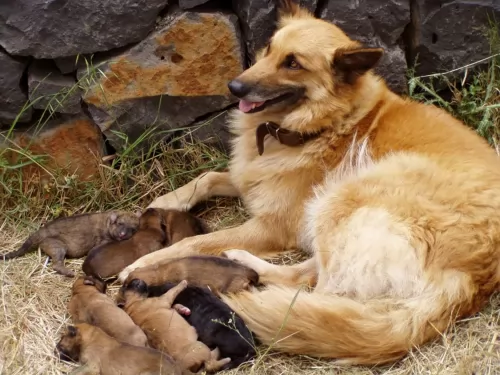 Your Pastor Garafiano can reach anything from 10 – 14 years of age if he is happy and well taken care of. Every dog however, can fall prey to one of the many common dog illnesses there are. Some of these are -
Your Pastor Garafiano can reach anything from 10 – 14 years of age if he is happy and well taken care of. Every dog however, can fall prey to one of the many common dog illnesses there are. Some of these are -
This is an inherited inflammatory disease of the skin, blood vessels and muscles. Signs of dermatomyositis can vary from mild to severe skin lesions and inflammation of muscles and even a decrease in muscle mass. Severely affected dogs can even have difficulty with swallowing. Symptoms of the disease are usually seen before the dog is 6 months of age.
This is an eye disease where there is a gradual deterioration of the retina. Dogs can become night blind early in the disease and as the disease goes on, they can even lose their daytime vision.
This is a very common dog ailment – the abnormal formation of the hip socket can cause pain, arthritis and even lameness. It is severe enough to know that dogs with hip dysplasia should never be bred.
 Remember that your Blue Heeler was once a full time cattle dog where he used to become totally and utterly exhausted from herding cattle. This is what he loved – the activity. If you have a Blue Heeler, you will need to provide him with plenty of exercise.
Remember that your Blue Heeler was once a full time cattle dog where he used to become totally and utterly exhausted from herding cattle. This is what he loved – the activity. If you have a Blue Heeler, you will need to provide him with plenty of exercise.
If you live on a farm, your Blue Heeler will be in his element because he can run, walk and swim to his heart’s content. If you keep your Blue Heeler in your back garden, you will need to provide him with ball games, rope games, long walks, running on a leash as you cycle and other activities.
Your Blue Heeler has a short, weather-resistant double coat. He’s not a heavy shedder, but he will have his share of seasonal shedding, so it’s a good idea to get into the habit of brushing him at least twice a week. This will get rid of all those loose hairs and keep his skin healthy by getting the blood flowing and distributing his natural oils.
Giving the best dog food for your Blue Heeler will come from either your home made food or a top quality commercially manufactured dog food. He is such a high energy dog, that your veterinarian can advise you on a dog food specially designed for high energy breeds.
These foods are well balanced and are enriched with amino acids and vitamins, promoting healthy bones and joints. Remember to include some raw meat into your dog’s diet and to ensure a constant source of cool, fresh water.
Ensure your Blue Heeler’s ongoing health by paying attention to ears, nails and teeth.
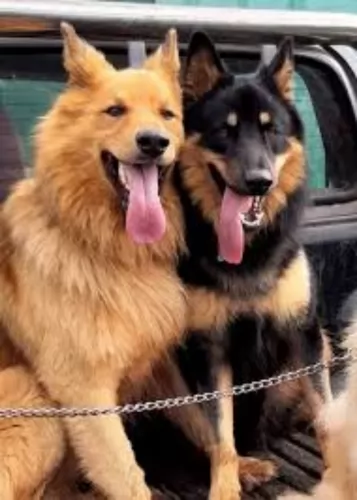 Groom your Pastor Garafiano at least twice a week. Your dog’s coat is fairly long and it sheds too and you want to make sure it doesn't become all matted. There are different brushes you can use for his beautiful coat.
Groom your Pastor Garafiano at least twice a week. Your dog’s coat is fairly long and it sheds too and you want to make sure it doesn't become all matted. There are different brushes you can use for his beautiful coat.
You can also use this grooming session to check other areas of your dog. Check inside his ears, check his eyes and feel for new or unusual lumps. Make sure to keep his nails trimmed.
Exercise your pet every day. Take him on walks or hikes and provide him with ball or frisbee games. Exercise keeps him fit and healthy but also happy and content.
Nutrition is of critical importance to your pet's wellbeing. It is important to know what your pet needs to stay healthy and have a strong immune system which can ward off disease.
There are some good commercially manufactured dog foods on the market but it is important to choose the one that doesn’t come filled with toxic colorants, preservatives and fillers. Protein should be high on the list of ingredients listed on the pet food packaging. Also make sure to feed your pet food that had been made for his size, his breed, his age and his energy requirements.
To provide some variety to your pet’s diet, give him some tasty home-made food. Dog’s do well on simplicity and consistency. Some boiled chicken, brown rice or pasta and some cooked vegetables such as spinach, sweet potato and carrots all chopped up and added into his dry kibble occasionally will keep him bright eyed and with his tail constantly wagging.
He’ll thank you for not varying his diet with things that can give him an upset stomach such as coffee, tea, popcorn, grapes, onions and chocolate.